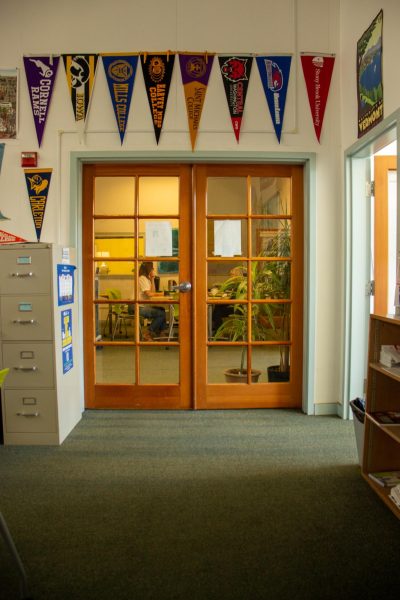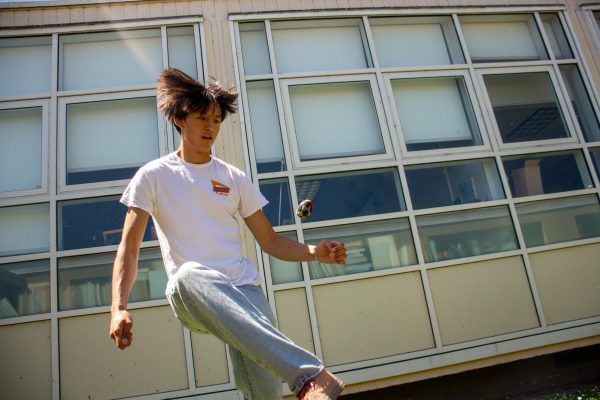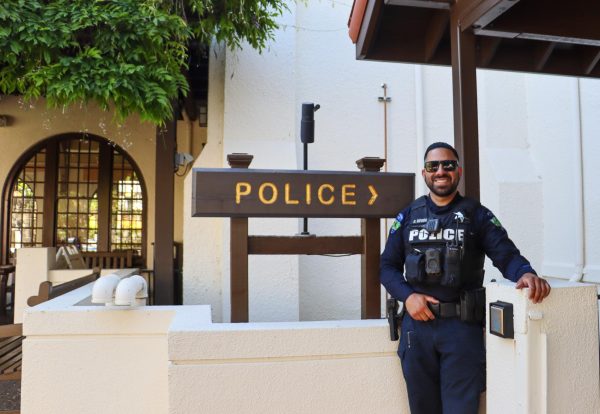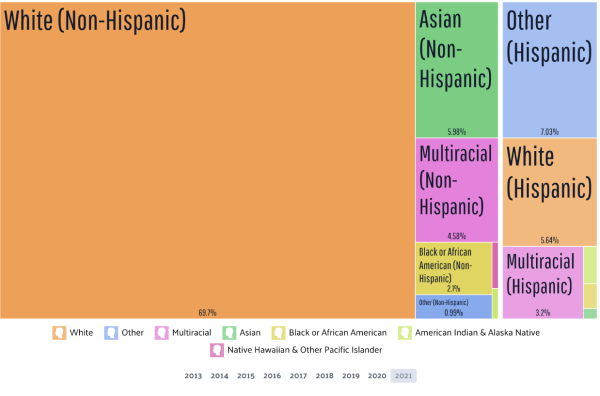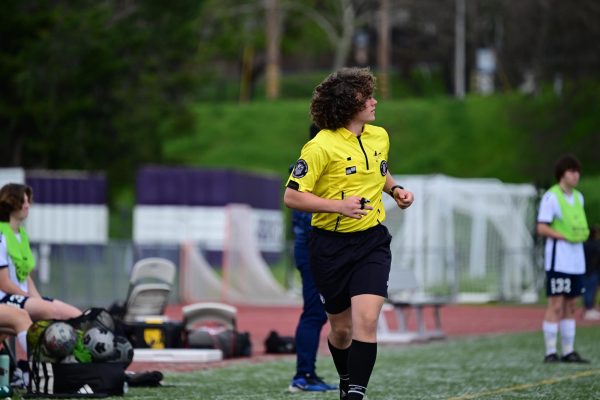Archie Williams does have a dress code, and it’s stricter than you think
Freshman Georgia Silva is refreshed by the relaxed dress code at AWHS compared to her previous school, White Hill.
You wouldn’t know it from walking the halls of Archie Williams, but our school does have a dress code. Despite Archie Williams’ aim to foster an environment promoting individuality, our documented dress code has many restrictions. And admin has almost entirely abandoned enforcing it.
A survey from clothing retailer Lands’ End found that the number of American public schools with a dress code increased by 21 percent from 2000 to 2013. In 2018, the percentage of public high schools in America with dress codes rose to 55.9 percent. As teenage fashion trends become less focused on covering skin, most American school boards become more determined to quash them. But students at progressive Archie Williams typically dress how they please around campus without the administration’s interception. However, the official TUHSD dress code, crafted in 1998, still contains a strict set of rules.
The restrictions prohibit tops, bottoms, and accessories depicting any words or pictures that could be seen as “inappropriate” in a school environment. Shoes must be closed toed and worn at all times. Despite their popularity around campus, crop tops are technically prohibited.
“Short-cropped, low-cut and open in the back and/or side tops which expose one’s stomach, chest, back or sides and short shorts/skirts are not appropriate,” the dress code states.
While the school does not enforce the official dress code, members of admin think the written TUHSD dress code needs to be reconstructed. Archie Williams Assistant Principal Nate Severin described the code as “very outdated.”
Last year, Severin attempted to change the official dress code, assuming that the process would be straightforward. Severin emailed the district office to figure out the process of changing the board policy, and found that he would have to go through the Archie Williams Site Council.
Consisting of parents, students, and staff, the site council makes decisions on what district policies should be added and removed. To even begin this process, a dress code committee would need to be formed. The procedure would be tedious, and admin does not plan on forming a committee anytime soon.
Principal LaSandra White thinks that there is a place for dress codes within reason. If a shirt is offensive or inappropriate, students should not wear it. At the same time, she believes fashion has evolved and so should the official dress code.
“The dress code needs some updating…But there are certain things that are difficult [to do] and there are some gray areas [in the code],” White said.
Freshman Rhiannon Connelly feels strongly about dress codes in public school, leading with the belief that strict dress codes strip student’s individuality and unfairly restrict female students’ clothing. Rhiannon appreciates the school’s relaxed approach because it allows students freedom of expression.
“I think that as long as people are comfortable in their clothes and are capable of learning in them, then no one else should care about it. If anything, [clothes] just shouldn’t promote hate against any group of people, or promote drugs and alcohol because we are underage,” Rhiannon said.
Rhiannon thinks the documented dress code and the one being enforced should be fair for everyone attending the school.
“I wouldn’t expect the [documented] dress code to be this strict, especially at Archie Williams when they try to be so accepting all the time,” Rhiannon said
Sophomore Nika Arye finds that in most cases, dress codes target girls.
“The board dress code is very sexist because it’s based on pieces of clothing that are trendy in girls’ fashion,” Nika said.
Archie Williams’ relaxed approach to dress coding students is refreshing for freshmen such as Georgia Silva. At Georgia’s middle school, White Hill, the enforced dress code lines up with that of the TUHSD board.
“At my old school in sixth grade, kids would get dress coded a lot for wearing crop tops,” Georgia said.
Georgia felt that like many schools, the dress code at White Hill was sexist.
“The dress code should not be sexist towards girls, and everyone should be able to wear what they are comfortable wearing,”
— Georgia
In an attempt to stray from promoting misogynistic ideals, Archie Williams admin tends to steer clear from enforcing “modesty” restrictions, but they stick closer to the code when it comes to inappropriate graphics on clothing items. Students cannot wear articles of clothing that advocate for substances that are illegal to students or that promote violence or hate.
This enforced section of the dress code does not present many issues, as students generally understand that they should not be representing illegal concepts at school. Still, some students wear trendy substance-related attire to school, such as Budweiser t-shirts and marijuana leaf sweatpants, hoping teachers won’t notice. When students get caught wearing a shirt advertising an illegal substance, they get told to flip it inside out or put a jacket on.
The dress code section on inappropriate graphics affects trends that are popular with all genders. Junior Lucas Silva thinks that as a male student, dress codes do not concern him beyond the graphic shirt restrictions, but he still feels that these rules are unnecessary.
“If I want to wear something like a Budweiser shirt, it doesn’t mean I’m an alcoholic or support [underage consumption of] beer. It’s a cool shirt,” Lucas said.
Archie Williams students are surprised to learn they have an official dress code, and mostly grateful for the lack of enforcement.
“What I decide to wear should be no one else’s decision but mine, I know what I am comfortable in for my own learning and it is unacceptable for anyone to force me to change it,” Rhiannon said.
But students like Rhiannon also wonder: if our school doesn’t agree with it or enforce it, will they abolish it?
Your donation will support the student journalists of Archie Williams High School. Your contribution will allow us to purchase equipment and cover our annual website hosting costs. Each donation will receive a magazine subscription for a year (6 copies a year), and become a part of the important work our publication is doing.
$35 -- Subscription to the magazine
$50 -- Silver Sponsorship
$75 -- Gold Sponsorship
$100 -- Platinum Sponsorship

Sophia is a freshman, in her first year of journalism. She was born in England and lived there for six years. You can find her painting or cooking, and...

Elliot is a senior, in his third year of journalism. He loves eating chicken pot pie and playing soccer. You can often find him watching Spongebob. He...




